Consumer optimism hits a high


Income growth and willingness to spend more are main driving forces
Consumer confidence in China has topped that in other major economies to equal a record high, and economists are saying this signals that consumption will support the world's second-largest economy, where growth is slowing.
A survey by global information company Nielsen shows China's consumer confidence index, based on its market research, rose to 110 in the second quarter from 108 in the first, indicating increased willingness to spend on consumer goods and services.
It also reached 110 in the second quarter of last year.
Zhang Monan, an economist at the State Information Center under the National Development and Reform Commission, said domestic demand, especially consumption, will become crucial to supporting economic growth in the second half of the year.
Tao Libao, vice-president of media research at Nielsen Greater China, said, "With the industrial transformation, consumption will become the growth engine."
The central government has pledged to promote structural reforms, shifting from investment-driven to consumption-oriented development, while ensuring stable economic growth and secure employment.
The Nielsen Global Consumer Confidence Index, released on Tuesday, rose to 94 in the second quarter, compared with 93 in the first.
A reading below 100 means that consumers are pessimistic about the outlook, while a reading above 100 signals optimistic expectations.
Nielsen said consumer confidence declined in 14 of 29 European countries as government budget cuts, tax rises and high unemployment continued.
Consumer confidence improved in the United States, along with increasing employment opportunities, higher home prices and a rising stock market, the company said.
In the second quarter, China had the fifth-highest reading of indices among 58 countries based on surveys covering more than 29,000 global respondents.
Fast growth of disposable income and people's willingness to spend more on improving quality of life, especially in large cities, was the main driving force behind this, the company said.
The average disposable income of urban Chinese residents was 13,649 yuan ($2,201) in the first half of the year, up 9.1 percent from a year earlier, while the disposable income of rural residents rose to 4,171 yuan, up 13 percent year-on-year, according to the National Bureau of Statistics.
Retail sales of consumer goods rose by 12.7 percent in the first six months to 11.08 trillion yuan, compared with a 12.4 percent growth rate in the first quarter, the bureau said.
Beijing, Shanghai and Guangzhou, with 7 percent of China's population, contributed about 25 percent of the country's spending on consumer products and services, Nielsen said.
As urbanization speeds up and consumers pursue a better quality of life, they will have a deeper understanding of consumption, said Yan Xuan, president of Nielsen Greater China.
There will be plenty of room to upgrade consumer products and "big-ticket" consumption goods such as cars will have more potential to develop, Yan said.
Nielsen's research shows that income and health remain the top concerns for Chinese consumers along with children's education, social welfare and environmental protection.
However, the slowdown in demand for labor in the manufacturing sector has dented consumers' perception about job prospects, Yan added.
China's economic growth slowed to 7.5 percent in the second quarter, the lowest since the third quarter last year and down from 7.7 percent in the first three months of the year.
Consumption contributed 3.4 percentage points to a 7.6 percent growth rate in the first six months, exports added 0.1 percentage point, and investment contributed 4.1 percentage points, remaining the biggest growth driver.
Stephen King, group chief economist with HSBC Holdings, said he is glad to see that China is undertaking structural reforms, which will benefit the country in the long term.
But the benefits will take some time to show, he said.
HSBC maintained its growth forecast at 7.4 percent this year. "If the rate is lower than 7 percent, we expect the government to take measures to stimulate growth. But that is highly unlikely," King said.

























